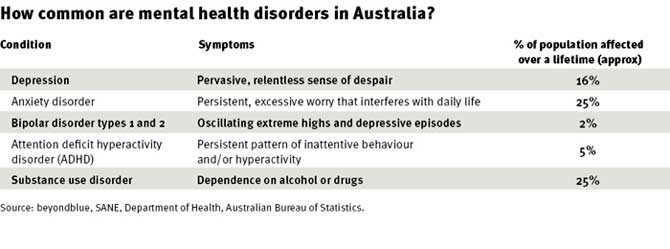At a glance
Who in their right mind would want to be an entrepreneur?
It’s easy to be dazzled by the glamour and acclaim achieved by the likes of Richard Branson and Apple founder Steve Jobs, but the reality of starting a venture from scratch is far from glamorous.
“You create the world’s worst job for yourself,” says Sydney-based Tom Dawkins, co-founder of the crowdfunding platform StartSomeGood. There are the gruelling hours, relentless stress, ongoing uncertainty and initially, no income.
“If you fail you have nothing to show for it,” says Dawkins.
Perhaps it takes “the eccentricities of genius”, as Charles Dickens’ famous character Mr Pickwick called it, to take on such a challenge.
It’s not a new suggestion that the veil between creative genius and madness is thin. Could it be that the traits required for entrepreneurship spring from the same gene pool as some mental health conditions?
"Here’s to the crazy ones ... because the ones who are crazy enough to think that they can change the world are the ones who do."
This is a question that intrigues Professor Michael Freeman from the University of California Medical School in San Francisco. Freeman’s current venture is Triggr Health, a digital platform to help people with addictions.
“I am an entrepreneur myself,” he explains, “and as CEO of my last company, I recognised that at least a third of the CEOs I did business with had clear mental health issues, so I was curious about that. More recently I have been saddened by reports of young entrepreneurs who committed suicide.
Are entrepreneurs different?
Earlier this year Freeman ran a study which revealed 49 per cent of entrepreneurs self-reported having one or more lifetime mental health conditions, compared with 32 per cent of the comparison group.
The study involved 242 entrepreneurs defined as business founders and 93 comparisons who were MBA students, graduates and faculty members.
The entrepreneurs were significantly more likely than the comparison group to report experiencing depression (30% vs 15%), attention deficit hyperactivity disorder (ADHD) (29% vs 5%), substance use conditions (12% vs 4%) and bipolar disorder (11% vs 1%) at some stage of their lives.
Thirteen of the 242 entrepreneurs were suicidal. Entrepreneurs free of mental health symptoms were twice as likely to have first-degree relatives experiencing mental health problems.
So what’s going on? It’s actually hard to say.
While Freeman’s findings are consistent with some other research reporting a higher rate of ADHD, bipolar and addiction among entrepreneurs, more robust German, British and Canadian studies have found entrepreneurs’ mental health to be no different or even better than people who are employees.
“It’s possible that many entrepreneurs are well adjusted and function at a higher level as a result of the autonomy, creativity and social aspects of their work,” says Freeman, “while some have pre-existing vulnerabilities and can get triggered.”
Does that make them any different from the rest of the community?
Almost seven Australians die each day due to suicide, and close to one in two people experience a mental health condition over a lifetime, according to beyondblue, Australia’s initiative to address depression.
Rates of mental health conditions are similar in the US and China.
Researchers have more work to do to establish any real differences. But there’s no doubt that entrepreneurial activity is gruelling and the sheer stress of it can be enough to tip the balance.
"At least a third of the CEOs I did business with had clear mental health issues."
“When the demands of the job exceed what the person is capable of, and the support available to them, then stress can build up, lead to burnout and precipitate in a formal diagnosis of depression and?/or anxiety,” says Dr Stephen Carbone from beyondblue.
Dawkins has come close to that feeling.
“Pushing through exhaustion every day becomes all-consuming and drags you down,” he says, remembering his time in his former not-for-profit enterprise, Vibewire.
“I had many dark days and by the time I departed in 2008 I was utterly burnt out.”
Repeated failure, a common feature of entrepreneurial activity, can also take its toll. Cameron Burgess, a serial entrepreneur and recent interim CEO of digital marketing company COG1, knows the territory well.
“A couple of years ago I experienced a series of failed business ventures. I was in debt and then my marriage broke down, in part due to my entrepreneurial bent, which involved lots of travel,” says Burgess.
“I went to a very dark place where I flirted with the idea of suicide.
“As an entrepreneur, there’s a tendency to shield the reality of the life you are living from everyone around you, lest you damage the image or success of your venture. So I didn’t talk to anyone about it – just drank and smoked and cried myself to sleep.
"Thankfully I had strong friendships that saw me through. Also, my tenacity is extremely high.”
The pros and cons of mania
The intense exhilaration and exhaustion of entrepreneurship can not only create mental imbalance, but may also attract it. The “up” state of some mental health conditions offers seemingly unbounded energy and creativity, well matched to the above-average demands of the job.
Heightened creativity and risk-taking, essential to business innovation, are also common features of ADHD and bipolar disorder.
Hypomania is a less severe form of mania, in which the person feels euphoric – high in mood, energy and creativity. Psychologist Dr John Gartner, author of The Hypomanic Edge: The link between (a little) craziness and (a lot of) success in America, contends that hypomania can be the wiring that makes some entrepreneurs successful.
Cameron Herold, who has already built three US$100 million-plus companies in his 20-year business career, tends to agree.
“I’m a little bipolar and it helps my business,” he told CBS news in April 2013. “You can either try to medicate [your symptoms] or you can learn how to leverage them. I do the latter.
“When I’m feeling really powerful, I can pull employees together, I can talk to the media, and I can go out and sell,” said Herold.
“What I can also do is make bad business decisions – such as setting a wildly aggressive budget or buying advertising that I don’t need – because I’m overly optimistic.
"So when I can tell I’m in a manic mood – I’m talking fast and jumping from idea to idea – I’ve learned to set aside certain business decisions for a few days until I’ve come back down a little.”
So is leveraging your mental health symptoms for business success a dangerous idea or an empowering new paradigm?
“At the end of the day it’s the client’s call how they manage their mental health,” says beyondblue’s Carbone.
“Some people do find treatment blunts them a bit and they don’t like that. But the vast majority of our consumers say they feel better for being treated and prefer an even keel.
“Mania, for example, which comes in varying degrees, can be so extreme it’s hard to distinguish it from a drug episode or schizophrenia. With hypomania, a milder form, you have a good sense of reality, but your judgement is still not the best.”
Freeman, who is also a psychiatrist, takes the approach that some mental health “differences” do have adaptive benefits. He coaches entrepreneurs who want to better understand and manage their mental health vulnerabilities while building on their strengths.
“For example, entrepreneurs with ADHD can learn how to delegate tasks, and employ staff who are detail-oriented and good at task completion, since difficulty with task follow-through is a vulnerability associated with ADHD,” he explains.
Emerging from the community of self-starters are those who have survived their brush with breakdown and want to support others. They are taking the first courageous step by talking about it.
“That’s why I’m doing this interview with you,” says Burgess.
"The intense exhilaration and exhaustion of entrepreneurship can not only create mental imbalance, but may also attract it."
Yet entrepreneurs are vital to our economy and way of life.
As Steve Jobs put it: “Here’s to the crazy ones ... Because the ones who are crazy enough to think that they can change the world are the ones who do.”
Look after yourself
You are not your enterprise, so build an identity that reflects that.
Create a community of supportive people around you who have nothing to do with your venture.
Have co-founders, employees and advisers who are willing to challenge the feasibility of implementing some of your ideas. Take care of your body: exercise, get enough sleep, eat well.
Don’t be afraid to ask for help if you are experiencing mental health symptoms. (In Australia, the beyondblue helpline is 1300 22 4636.)
Acknowledgments to: Michael Freeman, Cameron Burgess, Celia Hodson, Tom Dawkins.
The importance of entrepreneurs
“Entrepreneurs create the vast majority of new jobs, pull economies out of recessions, introduce useful products and services, and create prosperity.
During the depths of this American recession [in 2007-2008], entrepreneurs and their young companies produced nearly eight million of the 12 million jobs created in 2007, according to a 2009 report of the Kauffman Foundation Research Series: Firm Formation and Economic Growth.”


